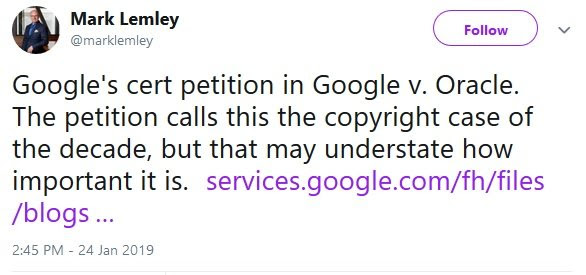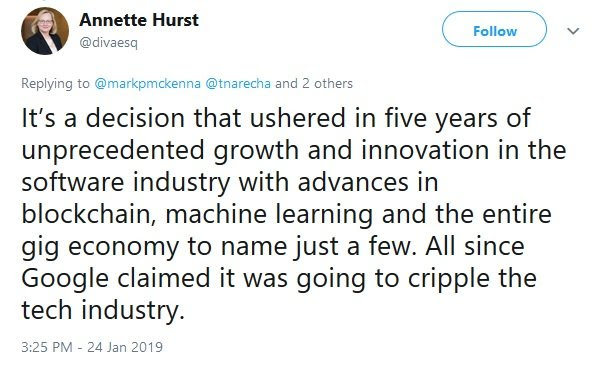

Round 2 in Oracle and Google's titanic copyright battle over Java APIs is now fully joined at the Supreme Court. Google asked the court in January to review two Federal Circuit decisions that it said threw “a devastating one-two punch at the software industry.” The company argues that copyright protection should not extend to “software interfaces,” and that lower courts “are badly in need of guidance on how to apply the fair-use doctrine in the context of computer code.”
Oracle fired back Wednesday, accusing Google of rehashing the same copyrightability arguments the court has already rejected, and of lining up “the usual list of amici” in an effort to muddle the state of fair use law.
“Nothing has changed” since the justices followed the solicitor general's recommendation to deny cert on copyrightability four years ago, Oracle states in a brief signed by Orrick Herrington & Sutcliffe partner Josh Rosenkranz. “Nor has software development suffered the devastating impact Google predicted; the industry is doing better than ever.”
➤ ➤ Would you like to receive Skilled in the Art as an email. Sign up here and receive the next issue straight to your inbox.
Google argues that the Java APIs shouldn't be copyrightable because they merely provide a shorthand for accessing preexisting libraries of code. Google wrote its own implementing code, and copied only the Java declarations so that programmers could use the language to create Android applications. The Federal Circuit ruled in 2014 that the APIs—11,500 lines of code organized into 37 packages—are copyrightable. On retrial, a San Francisco jury found Google's copying a fair use, but the Federal Circuit then ruled the use was not fair as a matter of law.
Google has drawn amicus support at the Supreme Court from some 75 IP scholars and from nonprofit advocacy groups such as the Electronic Frontier Foundation, Public Knowledge, Engine Advocacy and the Computer and Communications Industry Association. Microsoft, which previously supported Oracle on copyrightability, is backing Google on fair use.
Oracle says in Wednesday's filing that there's no circuit split on fair use to resolve, and no reason to excuse Google's “egregious” copying of an entire software platform. “Neither Google nor its amici cites a single case—in any court—that has ever found it permissible to copy this much code (or this much structure and organization)” and use it for the same purpose, Rosenkranz writes.
The idea that the Federal Circuit upset the law of fair use is “vacuous, no matter how many amici Google could recruit to sign briefs attesting to their unwarranted contrary expectation,” Rosenkranz adds.
“Google's theory is that, having invested all those resources to create a program popular with platform developers and app programmers alike, Oracle should be required to let a competitor copy its code so that it can coopt the fan base to create its own best-selling sequel,” he concludes. “That argument would never fly with any other copyrighted work.”
Also signing onto Oracle's brief in opposition are Orrick partner Annette Hurst, Kirkland & Ellis partner Dale Cendali, and Oracle general counsel Dorian Daley, and associate GCs Deborah Miller and Matthew Sarboraria. Google's team includes counsel of record Kannon Shanmugam of Paul, Weiss, Rifkind, Wharton & Garrison and attorneys from Goldstein & Russell; Keker, Van Nest & Peters; King & Spalding; and Kwun Bhansali Lazarus.
This content has been archived. It is available through our partners, LexisNexis® and Bloomberg Law.
To view this content, please continue to their sites.
Not a Lexis Subscriber?
Subscribe Now
Not a Bloomberg Law Subscriber?
Subscribe Now
NOT FOR REPRINT
© 2025 ALM Global, LLC, All Rights Reserved. Request academic re-use from www.copyright.com. All other uses, submit a request to [email protected]. For more information visit Asset & Logo Licensing.
You Might Like
View All
'A Death Sentence for TikTok'?: Litigators and Experts Weigh Impact of Potential Ban on Creators and Data Privacy

Shareholder Democracy? The Chatter Musk’s Tesla Pay Case Is Spurring Between Lawyers and Clients
6 minute read

Many LA County Law Firms Remain Open, Mobilize to Support Affected Employees Amid Historic Firestorm
Trending Stories
- 1'A Death Sentence for TikTok'?: Litigators and Experts Weigh Impact of Potential Ban on Creators and Data Privacy
- 2Bribery Case Against Former Lt. Gov. Brian Benjamin Is Dropped
- 3‘Extremely Disturbing’: AI Firms Face Class Action by ‘Taskers’ Exposed to Traumatic Content
- 4State Appeals Court Revives BraunHagey Lawsuit Alleging $4.2M Unlawful Wire to China
- 5Invoking Trump, AG Bonta Reminds Lawyers of Duties to Noncitizens in Plea Dealing
Who Got The Work
J. Brugh Lower of Gibbons has entered an appearance for industrial equipment supplier Devco Corporation in a pending trademark infringement lawsuit. The suit, accusing the defendant of selling knock-off Graco products, was filed Dec. 18 in New Jersey District Court by Rivkin Radler on behalf of Graco Inc. and Graco Minnesota. The case, assigned to U.S. District Judge Zahid N. Quraishi, is 3:24-cv-11294, Graco Inc. et al v. Devco Corporation.
Who Got The Work
Rebecca Maller-Stein and Kent A. Yalowitz of Arnold & Porter Kaye Scholer have entered their appearances for Hanaco Venture Capital and its executives, Lior Prosor and David Frankel, in a pending securities lawsuit. The action, filed on Dec. 24 in New York Southern District Court by Zell, Aron & Co. on behalf of Goldeneye Advisors, accuses the defendants of negligently and fraudulently managing the plaintiff's $1 million investment. The case, assigned to U.S. District Judge Vernon S. Broderick, is 1:24-cv-09918, Goldeneye Advisors, LLC v. Hanaco Venture Capital, Ltd. et al.
Who Got The Work
Attorneys from A&O Shearman has stepped in as defense counsel for Toronto-Dominion Bank and other defendants in a pending securities class action. The suit, filed Dec. 11 in New York Southern District Court by Bleichmar Fonti & Auld, accuses the defendants of concealing the bank's 'pervasive' deficiencies in regards to its compliance with the Bank Secrecy Act and the quality of its anti-money laundering controls. The case, assigned to U.S. District Judge Arun Subramanian, is 1:24-cv-09445, Gonzalez v. The Toronto-Dominion Bank et al.
Who Got The Work
Crown Castle International, a Pennsylvania company providing shared communications infrastructure, has turned to Luke D. Wolf of Gordon Rees Scully Mansukhani to fend off a pending breach-of-contract lawsuit. The court action, filed Nov. 25 in Michigan Eastern District Court by Hooper Hathaway PC on behalf of The Town Residences LLC, accuses Crown Castle of failing to transfer approximately $30,000 in utility payments from T-Mobile in breach of a roof-top lease and assignment agreement. The case, assigned to U.S. District Judge Susan K. Declercq, is 2:24-cv-13131, The Town Residences LLC v. T-Mobile US, Inc. et al.
Who Got The Work
Wilfred P. Coronato and Daniel M. Schwartz of McCarter & English have stepped in as defense counsel to Electrolux Home Products Inc. in a pending product liability lawsuit. The court action, filed Nov. 26 in New York Eastern District Court by Poulos Lopiccolo PC and Nagel Rice LLP on behalf of David Stern, alleges that the defendant's refrigerators’ drawers and shelving repeatedly break and fall apart within months after purchase. The case, assigned to U.S. District Judge Joan M. Azrack, is 2:24-cv-08204, Stern v. Electrolux Home Products, Inc.
Featured Firms
Law Offices of Gary Martin Hays & Associates, P.C.
(470) 294-1674
Law Offices of Mark E. Salomone
(857) 444-6468
Smith & Hassler
(713) 739-1250






